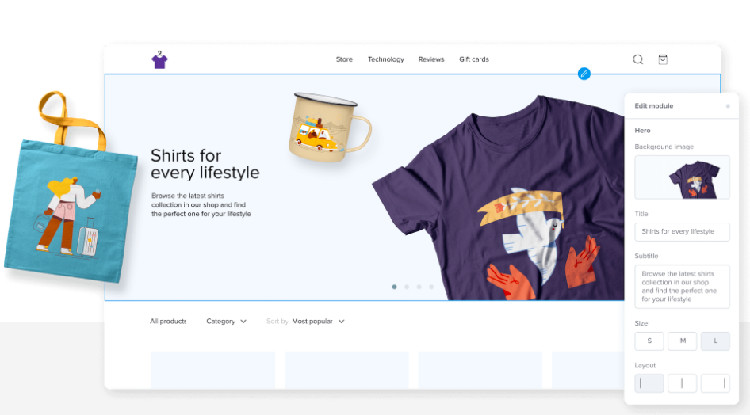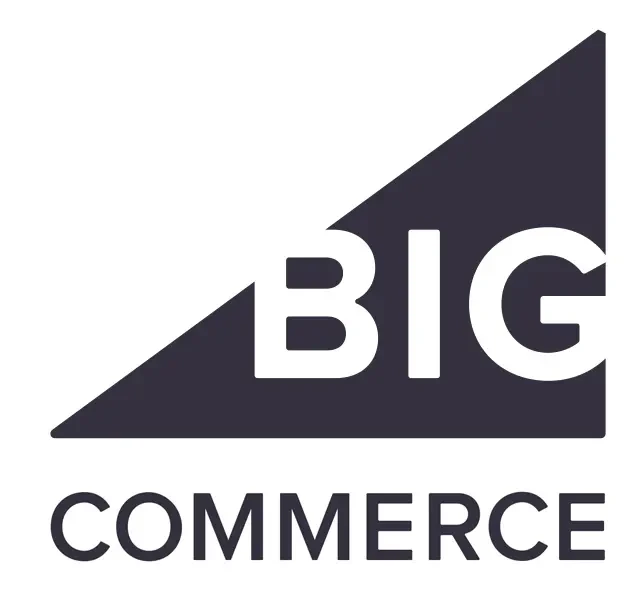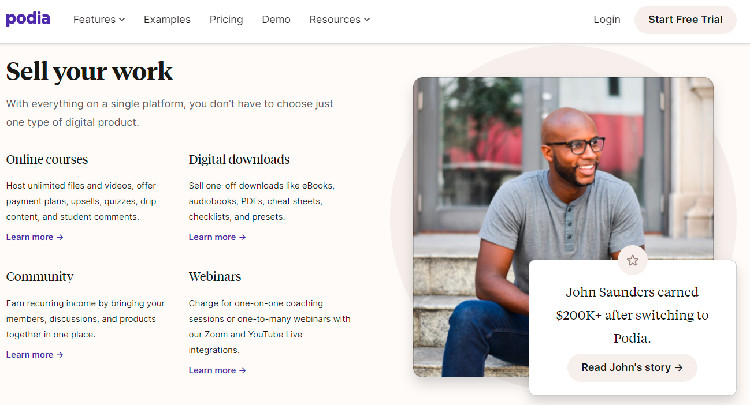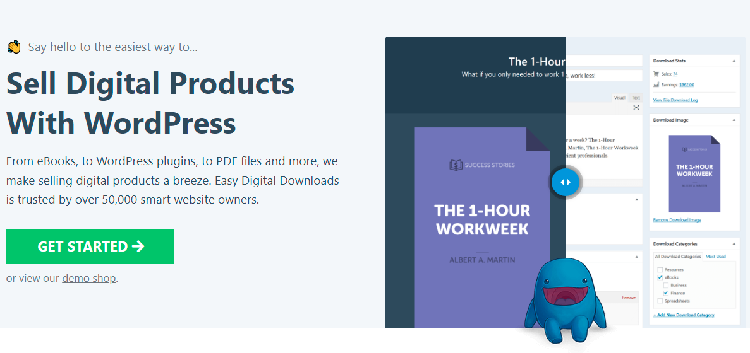- What Are Digital Products?
- What to Look for In an Ecommerce Platform for Digital Products
- Best Ecommerce Platforms for Digital Products
- 1. Sellfy
- 2. Teachable
- 3. BigCommerce
- 4. Podia
- 5. Gumroad
- Other Top E-commerce Platforms for Digital Products
- FAQs
- Conclusion: Top eCommerce Platforms for Digital Goods
Online retail is a trillion-dollar industry and continues to grow year on year. In an industry forecasted to grow to $7.4 trillion by 2025, businesses must establish their online presence to remain competitive.
There is no exemption for merchants looking to sell digital products. While digital products have a low overheads cost, the problem still exists as to which eCommerce platform will best suit their needs.
The best eCommerce platform for digital products should scale as the catalog grows, provide a seamless user experience, and maintain security. It should also include additional features such as order management capabilities, payment processing tools, shipping rates calculators, among others.
Bottom line up front: There are multiple eCommerce platforms for selling digital products with all kinds of features but my pick is Sellfy. It has an intuitive interface, important tools required to sell your digital products, and robust SEO capabilities to make them discoverable on search engines.
The best platforms include:
- Sellfy: Best Overall for Digital Products
- Teachable: Best Platform for Selling Digital Courses
- BigCommerce: Best Platform for Selling Digital Products + Physical Products
- Podia: Best Membership Platform for Digital Content
- Easy Digital Products: Best WordPress Plugin to Sell Digital Products
- Gumroad: Best Free Platform for Selling Digital Products
What Are Digital Products?
Digital products are intangible products or services delivered over the internet.
They are primarily used in industries such as Information Technology, Legal, Education, and Business Marketplaces, to name a few. The products depend on the customers’ preferences for where they want to download or access them.
Digital products include:
- eBooks / Magazines
- Video Tutorials and Courses
- Logo Templates and Graphics Files
- Software Downloads and Apps
- Music, Movies, TV Series or Audio Recordings
- Image Collections
- Photography
- Web Elements
- Research and data
- Recipes
- Podcasts
- Swipe files
To keep things simple, when referring to digital products in this article, we will collectively refer to all listed intangible products and services as digital products.
What to Look for In an Ecommerce Platform for Digital Products
Not all ecommerce platforms are suitable to sell digital products. Here are some of the features to look out for in your ecommerce platform:
1. Search Engine Optimization (SEO)
Ecommerce without SEO is like having a brick-and-mortar store without signage. It’s nearly impossible to drive traffic to your store if it’s not visible on search engines. An eCommerce platform that is SEO friendly will help you reach a wider audience and convert them into loyal customers.
Some key SEO features to look for include:
- Optimized URL structures
- Simple 301 redirects
- Customizable tags, URLs, meta descriptions, and title tags
- Internal search feature
- Mobile customization
- robots.txt
2. Multiple Payment Gateways
Having a wide range of payment gateways ensures that customers can purchase your product regardless of their country or currency. The ability to process online credit card transactions is also an assurance that you won’t lose prospective customers due to a lack of payment options. Some eCommerce platforms offer:
- 2D and 3D Secure credit/debit card processing
- International merchant accounts for global payments
- Alternative Payment Gateways such as PayPal, Alipay, and others
3. Marketing and Promotional Tools
Aside from looking for a platform that supports SEO, it’s also essential to select eCommerce platforms that offer extensive marketing and promotional tools. Such tools allow merchants to advertise their products to attract more customers.
Some of these tools include:
- Email marketing
- Call tracking
- Carrier solutions for SMS and MMS marketing
- Social media integration
- Promotional coupons, gift cards, order notifications, etc.
- Upsell and cross-sell opportunities for additional products
4. eCommerce Digital Download Security
Security is a top priority for any company selling digital products on the internet. It’s no different for merchants selling digital products through eCommerce platforms.
One way to assure customers of your platform’s security is to have a PCI-compliant payment gateway. The website should have an SSL certificate to encrypt all order and user information transmitted online.
5. Customization Options
The eCommerce platform’s customization options determine how much control you have over your online store. A platform that offers advanced customization options lets you alter the theme, colors, and fonts. The platform should also allow you to use code snippets for advanced customizations of your website.
6. Reporting and Analytics
An eCommerce platform with reporting and analytics tools allows you to track users’ activities on your website. You can then analyze their behavior to improve your marketing strategies, conversion rates, etc. Tools such as Google Analytics give you a better understanding of your customers’ preferences and spending habits.
7. Integrations and Social Media Connections
Having robust integrations and social media connections ensures that your eCommerce platform can work with other marketing tools and social media sites. Through such integrations, you can spread the word about your products on Facebook or Twitter without having to post updates manually. You can also integrate a third-party email marketing service to send newsletters and promotional materials to customers.
Best Ecommerce Platforms for Digital Products
Below is a detailed analysis of the best eCommerce platforms for digital products.
1. Sellfy
Sellfy is by far the best platform for merchants to sell digital products. It has all the features you expect from a top eCommerce platform, such as integrated analytics, SEO-friendly URLs and tags, and multiple payment gateways.
Sellfy’s best feature is customizability. Merchants can use its extensive code snippets and HTML editor to control how their product pages look. The platform is also optimized for mobile devices, ensuring that customers can easily purchase your products even when they’re on the go.
It allows merchants to customize landing pages, product pages, email campaigns, etc. Sellfy also has an extensive list of integrations to fit the needs of any digital business.
With its pre-built integrations, you can add a Facebook store to your website, share items on Twitter and Pinterest, add reviews from other marketplaces and social media platforms, and more.
The platform also allows merchants to sell videos on demand. Your customers can stream videos for free without the risk of piracy or buy them to download. Sellfy also has a user-friendly interface where customers can preview videos before purchasing.
Sellfy Pricing
Sellfy has three pricing plans:
Sellfy offers a 24-day free trial to help merchants figure out if it’s the right eCommerce platform for their business. If your sales exceed $200,000, you can contact the sales team for a customized quote.
Sellfy Pros
- Instant payouts
- Easy to use
- In-depth analytics
- Supports multiple languages
- It comes with Patreon integrations
- No transaction fees
- Features Facebook live chat
- Customizable page layouts
Sellfy Cons
- The basic plan lacks email marketing features
- The support could be better
- Lacks affiliate marketing management tools
2. Teachable
Teachable is an excellent eCommerce platform for teachers, trainers, and coaches. More than 100,000-course creators use the platform to offer high-quality courses on various topics, from baking to photography and foreign languages. Teachable provides comprehensive features, especially for creators who aren’t tech-savvy.
Its crisp-clear interface is easy to navigate and understand, even for first-time users. Customizations are straightforward, allowing users to build a website that reflects their brand quickly. The dashboard lets merchants keep tabs on their sales, analyze their traffic sources and optimize the checkout process.
Teachable offers unlimited video bandwidth for all users. There’s also an option for group coaching or one-on-one tutoring. Once the customer finishes a particular course, there are certifications available along with surveys and feedback forms to get a better idea of the strengths and weaknesses of the course.
The platform support integrations with other tools such as Zoom, Zapier, Calendly Mailchimp, Intercom, and ConvertKit. Teachable also allows its users to offer memberships, subscriptions, coupons, and one-time payments.
Completely FREE to start, UNLIMITED courses to create, and dedicated specifically to delivering online courses. This is why Teachable is the better option for course creators here!
Teachable Pricing
Teachable has three pricing plans:
- Teachable Basic Plan: $29/Month (Billed annually)
- Teachable Pro Plan: $99/Month (Billed annually)
- Teachable Business Plan: $249/Month (Billed annually)
Teachable offers a free plan without any limits. However, it limits the features to only those that you need to create a course and not its full range of capabilities.
Teachable Pros
- Users can create unlimited courses
- The customer support is great
- Easy to use and launch
- Numerous options for integration
- Continuous feature updates and improvements
Teachable Cons
- Lacks email integration features
- It has transaction fees on all plans
Other Teachable Alternatives vs Other LMS Systems:
3. BigCommerce
BigCommerce is one of the most popular eCommerce platforms online. It offers competitive features and functionalities for digital businesses of all sizes and types. As a hosted platform, it provides merchants with intuitive tools and powerful analytics to connect with their customers.
Users can tweak the interface using HTML and CSS code or a drag-and-drop interface to customize their website. Notably, almost all tools needed to run a successful eCommerce store are available on this platform. Merchants don’t have to integrate numerous tools and plugins to make their websites work.
This feature saves time and money that otherwise would be spent on development costs. Analytics is a win-win for both merchants and their customers. Merchants can track the entire purchase process in real-time to determine where inefficiencies lie in the process. Customers can use customer service tools, including live chat and phone support.
Notably, it comes with extensive inbuilt marketing tools, making growth easier for merchants. Besides paid ad campaigns, it also offers organic marketing tools to get the best exposure on search engines. The comprehensive SEO tools, for instance, let merchants optimize their website and content to deliver better traffic.
If you intend to sell your digital products to countries in the European Union, you must familiarize yourself with the VAT Mini One-Stop-Shop (VAT MOSS). This requirement applies if you intend to raise more than 10,000 Euros/Year in revenue. The conditions are country-specific, so you’ll have to apply for country-specific VAT rates on digital products.
We partnered up BIG TIME with BigCommerce to bring you an offer you simply cannot miss: Save 10% yearly on your selected plan after you request your Demo (Valid until Dec 31st 2021).
BigCommerce Pricing
BigCommerce has four pricing plans.
- BigCommerce Standard Plan: $29.95/month
- BigCommerce Plus Plan: $79.95/Month
- BigCommerce Pro Plan: $299.95/Month
- BigCommerce Enterprise Plan: (Contact sales team)
BigCommerce offers a 15-day free trial for merchants to test the service and explore all functionalities. The Enterprise plan pricing will depend on the customer’s online sales and business requirements.
BigCommerce Pros
- No transaction costs on any of the plans
- Creating custom fields is easy
- It has comprehensive SEO features
- Features an all-around “abandoned cart saver”
- There’s a built-in blog
BigCommerce Cons
- It’s not the most affordable, especially for beginners who don’t have significant online sales
- The built-in blog lacks RSS feeds
- The free themes are somewhat similar to each other
Further Reading on BigCommerce Alternatives vs Other Platforms:
- BigCommerce vs WooCommerce Shopping Cart System
- BigCommerce vs Magento Ecommerce Features
- BigCommerce vs Volusion eCommerce Features
- BigCommerce vs Shopify eCommerce Functionality
- BigCommerce vs 3dcart eCommerce Features
4. Podia
Podia is a platform where merchants can sell digital products such as downloads, webinars, and memberships. It’s one of the best eCommerce platforms for digital products primarily because of its flexibility. Merchants can upload unlimited products, create multiple plans for them, and determine the pricing.
Upon first glance, the intuitive interface indicates its ease of use. It’s one of those eCommerce platforms that you can begin using right away without having to read a manual, unlike most other tools and plugins. It’s simple enough for beginners to use, but it has advanced features that let experienced users create complex functions.
The digital downloads feature allows merchants to sell PDFs, checklists, eBooks, Videos, cheat sheets, and audio without any coding experience. Sellers can also add webinars to their website and sell access to them. Podia boasts extensive marketing features, including email marketing and newsletters.
The security feature is top-notch. Podia doesn’t collect information from merchants’ customers. Instead, all the data is stored on a separate secure server with round-the-clock monitoring from an expert team of security professionals. All transactions go through an encryption process protected by 128-bit SSL security.
I LOVE Podia. Here's why. It's simple to use . Fun. Works for courses, digital products, and memberships like a charm. It's going to be our FINALIST for 2023 Tools of the Year. Need I say more?
Podia Pricing
Podia has three pricing plans:
- Podia Mover Plan: $39/Month
- Podia Shaker Plan: $89/Month
- Podia Earthquaker Plan: $199/Month
Podia offers a 14-day free trial where merchants can explore all features.
Podia Pros
- The pricing plans are affordable
- It has one of the best security features on the market
- Easy to use
- Extensive customization features
- Continuous feature updates
Podia Cons
- The automation feature could use more advanced tools
- Merchants will need to have selling skills for their products
Further Reading on Podia Alternatives Compared:
5. Gumroad
Behold Gumroad, a digital product seller’s best friend. Gumroad’s wide range of features is what makes it one of the most sought-after eCommerce platforms in its category. Its simple interface makes it easy for beginners to upload and download digital products.
Gumroad is more than just a checkout option. It provides sellers with extensive marketing features that include promoting products on social media. Sellers can track the performance of their products using built-in analytics and create email campaigns to boost their income.
It has tools that will keep your visitors in the loop. The auto-updates features ensure your marketing functionalities are always up-to-date. You can also generate links for influencers and affiliate marketers to market your products.
Unlike some eCommerce platforms, you can create coupon codes with Gumroad and send them via Email or Direct Message. It’s helpful for those who want to give out promotional codes for their services and products. It also offers on-demand SD streaming, which is excellent for professionals who provide webinars, lectures, and courses.
Gumroad Pricing
The Gumroad pricing is a bit complicated. However, it’s free to start, but charges will apply for each transaction made online. Merchants have to pay $10 for each month plus an additional 3.5% and a 30% charge for each transaction.
UPDATE: As of December 2022, Gumroad has significantly raised their fees. Gumroad still might be an option for some, but I’d recommend these alternatives instead.
Gumroad Pros
- Fair pricing
- Support is always ready to help
- Easy to use and beginner-friendly
- Amazing marketing features
- Features exciting SEO features
Gumroad Cons
- Transactional charges
- The platform could use more customization features
- NEW for 2023: Terribly thought out new price hikes than penalize successful sellers.
Other Top E-commerce Platforms for Digital Products
If the above eCommerce platforms don’t fit the bill, here are some alternatives you can use:
FAQs
Question: What is the Best Way to Sell Digital Products?
Question: Can You Sell Digital Products on Instagram?
Question: How do I Launch a Digital Product?
Question: How Much Does it Cost to Make an eCommerce Store?
Conclusion: Top eCommerce Platforms for Digital Goods
The eCommerce platform for digital products offers extensive marketing tools. It should also feature attractive SEO features and product management tools. One that is highly customizable, offers user-friendly interfaces, is secure, and has multiple payment gateways for international transactions is ideal.
After extensive research and testing, I recommend using Sellfy as the best e-commerce platform for digital products. It offers all the features you need to successfully launch your business, including an easy-to-navigate user interface and all the necessary SEO features to make your content discoverable.
Other tools such as BigCommerce, Teachable, Podia, and Gumroad are also helpful alternatives to Sellfy.
Further Reading on eCommerce Platforms Storefront Type:
- Selling clothes? See our Best eCommerce Platforms for Clothes guide.
- Selling digital products? See our Best eCommerce Platforms for Digital Products guide.
- Primarily interested in dropshipping? see our Best eCommerce Platforms for Dropshipping guide.
- Focused on SEO? Check out our top eCommerce Platforms for SEO guide.
- Selling artistic creations? Check out our Best eCommerce Platforms for Artists guide.












